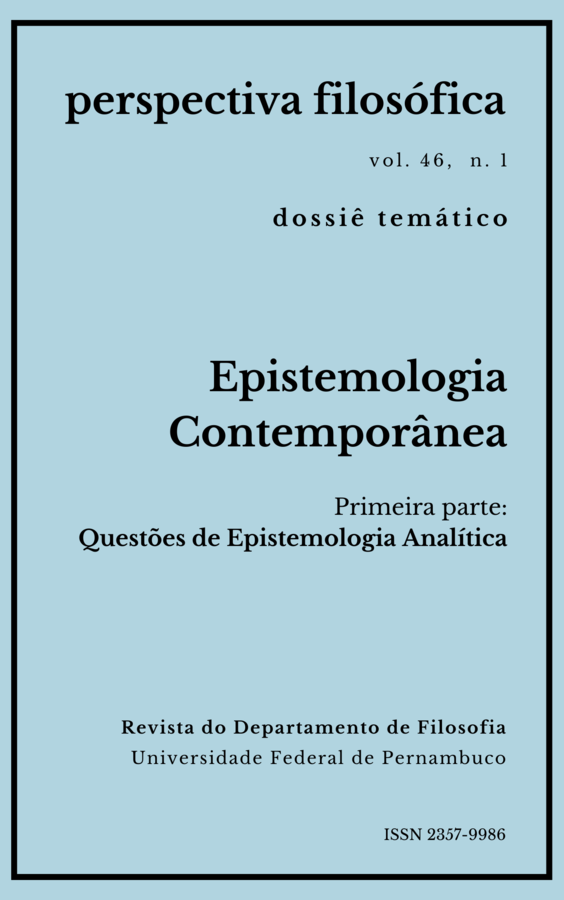O que é preciso para ser um externista em epistemologia?
DOI:
https://doi.org/10.51359/2357-9986.2019.247943Palavras-chave:
internismo, externismo, justificação, derrotadoresResumo
Neste artigo discutiremos duas perguntas: (i) O que caracteriza a disputa entre internismo e externismo na epistemologia contemporânea?; (ii) O externismo é compatível com a defesa de uma cláusula antiderrota? Ambas são matéria de controvérsia. Arguiremos que há uma resposta preferível para a primeira pergunta: a disputa entre internismo e externismo é fundamentalmente uma disputa sobre qual é o papel de relações mente-mundo na aquisição de justificação epistêmica. Dada essa resposta, sustentaremos que também há uma resposta preferível para a segunda pergunta: sim, um externista pode defender uma cláusula antiderrota. Mostraremos, com base nisso, que algumas alegações encontradas na literatura recente são incorretas.Referências
ALSTON, W. P. An Internalist Externalism. In: Synthese 74 (3): 265-283,1988.
ALSTON, W. P. Beyond “Justification”: Dimensions of EpistemicEvaluation. Cornell University Press, 2005.
BAKER-HYTCH, M.; & BENTON, M. Defeatism Defeated. PhilosophicalPerspectives 29 (1):40-66, 2015.
BEDDOR, B. Process Reliabilism’s Troubles With Defeat. ThePhilosophical Quarterly Vol. 65, No. 259, 2015.
BERGMANN, M. Internalism, externalism and the no-defeater condition.Synthese 110 (3):399-417, 1999
BERGMANN, M. Justification Without Awareness: A Defense ofEpistemic Externalism. Oxford University Press, 2006
BERGMANN, M. Externalist Responses to Skepticism. In: Greco, J. (ed),The Oxford Handbook of Skepticism. Oxford University Press, 2008.
BONJOUR, L. Externalist Theories of Empirical Knowledge. MidwestStudies in Philosophy 5 (1):53-73, 1980
BONJOUR, L. The Structure of Empirical Knowledge. Harvard UniversityPress, 1985.BONJOUR, L.; & SOSA, E. Epistemic Justification: Internalism Vs.Externalism, Foundations Vs. Virtues. Wiley-Blackwell, 2003
CARTER, J. A.; & PALERMOS, S. O. Epistemic Internalism, ContentExternalism and the Subjective/Objective Justification Distinction. In:American Philosophical Quarterly 53 (3): 231-244, 2016.
COMESAÑA, J. Evidentialist Reliabilism. In: Nous 44 (4): 571-600, 2010.
CONEE, E. & FELDMAN, R. Evidentialism: Essays in Epistemology.Oxford University Press, 2004.
COHEN, S. Justification and Truth. In: Philosophical Studies 46 (3): 279-295, 1984.
CHISHOLM, R. The Ethics of Requirement. American PhilosophicalQuarterly 1 (2):147 – 153, 1964.
DAVID, M. Truth as the Primary Epistemic Goal: A Working Hypothesis.In: Sosa, E., Steup. M., Turri, J. (eds.), Contemporary Debates inEpistemology. Wiley Blackwell, 2013.
FELDMAN, R. Justification Is Internal. In: Sosa, E., Steup. M., Turri, J.(eds.), Contemporary Debates in Epistemology. Wiley Blackwell, 2013.
FUMERTON, R. Metaepistemology and Skepticism. Rowan and LittlefieldUSA, 1995.
GETTIER, E. Is justified true belief knowledge?. IN: Analysis, 23, p. 121 –123, 1963.
GOLDMAN, A.. What is Justified Belief? In: George Pappas (ed.),Justification and Knowledge. Boston: D. Reidel. pp. 1-25, 1979.
GOLDMAN, A. Epistemology and Cognition. Harvard UniversityPress,1986.
GOLDMAN, A. Toward a Synthesis of Reliabilism and Evidentialism? Or:Evidentialism’s Troubles, Reliabilism’s Rescue Package. In: Dougherty, T.(ed.), Evidentialism and its Discontents. Oxford University Press USA,2011.
GOLDMAN, A.; & BEDDOR, B. Reliabilist Epistemology. In: Zalta, E.(ed.), Stanford Encyclopedia of Philosophy, 2015.
GOLDBERG, S. What Is the Subject-matter of the Theory of EpistemicJustification? In: Henderson, D. & Greco, J. (eds.), Epistemic Evaluation:Purposeful Epistemology. Oxford University Press UK, 2015.
GRECO, J. Achieving Knowledge: A Virtue-Theoretic Account ofEpistemic Normativity. Cambridge University Press, 2010.
GRECO, J. Justification is Not Internal. In: Sosa, E., Steup. M., Turri, J.(eds.), Contemporary Debates in Epistemology. Wiley Blackwell, 2013.
KVANVIG, J. Truth is Not the Primary Epistemic Goal. In: Sosa, E., Steup.M.,Turri, J. (eds.), Contemporary Debates in Epistemology. WileyBlackwell, 2013.
LASONEN-AARNIO, M. Unreasonable Knowledge. PhilosophicalPerspectives 24 (1):1-21, 2010.
LEHRER, K.; & COHEN, S. Justification, Truth, and Coherence. In:Synthese 55: 191-207, 1983.
MADISON, B. J. C. Epistemic Internalism. Philosophy Compass 5 (10):840-853, 2010.
NOZICK, R. Philosophical Explanations. Harvard University Press, 1981.
PLANTINGA, A. Warrant: The Current Debate. Oxford University Press,1993a.
PLANTINGA, A. Warrant and Proper Function. Oxford University Press,1993b.
POLLOCK, J. Knowledge and Justification. Princeton University Press,1974.
PUTNAM, H. Brains in a Vat. In: Reason, Truth, and History. CambridgeUniversity Press, 1981.
SENOR, T. The prima/ultima facie justification distinction in epistemology,IN: Philosophy and Phenomenological Research, 55, p. 551–566, 1996.
SOSA, E. Knowledge in Perspective. Cambridge University Press USA,1991.
SRINIVASAN, A. Radical Externalism. No prelo.
STEUP, M. Internalist Reliabilism. In: Philosophical Issues 14 (1): 403-425,2004.
Downloads
Publicado
Edição
Seção
Licença
A Revista Perspectiva Filosófica orienta seus procedimentos de gestão de artigos conforme as diretrizes básicas formuladas pelo Conselho Nacional de Desenvolvimento Científico e Tecnológico (CNPq). http://www.cnpq.br/web/guest/diretrizesAutores que publicam nesta revista concordam com os seguintes termos:
Os autores mantém os direitos autorais e concedem à revista o direito de primeira publicação, sendo o trabalho simultaneamente licenciado sob https://creativecommons.org/licenses/by/4.0/deed.pt_BR que permite o compartilhamento do trabalho com reconhecimento da autoria e publicação inicial nesta revista.
Os autores têm autorização para assumir contratos adicionais separadamente, para distribuição não-exclusiva da versão do trabalho publicada nesta revista, com reconhecimento de autoria e publicação inicial nesta revista (Consultar http://opcit.eprints.org/oacitation-biblio.html).

Esta revista está licenciada com uma Licença Creative Commons Atribuição 4.0 Internacional.













